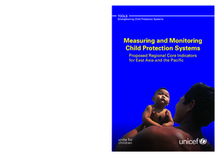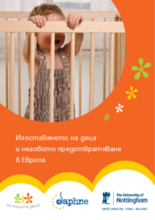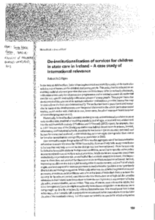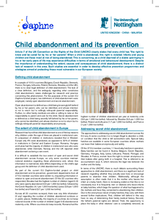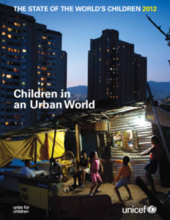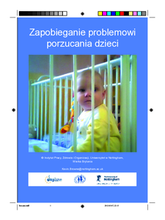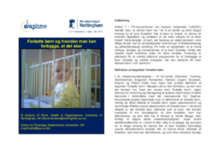Displaying 1371 - 1380 of 1798
This publication proposes a framework of core indicators for measuring and monitoring national child protection systems in the East Asia and Pacific region.
This document is a Hungarian language summary brochure of the Manual of Good Practice titled ‘Child Abandonment and its Prevention in Europe,’ specific to child abandonment in Hungary.
This document is a Bulgarian language summary brochure of the Manual of Good Practice titled ‘Child Abandonment and its Prevention in Europe,’ specific to child abandonment in Bulgaria.
This paper describes Ireland’s successful implementation of a policy of de-institutionalization of out-of-home care for children.
This document is an English language summary brochure of the Manual of Best Practice titled ‘Child Abandonment and its Prevention in Europe,’ specific to child abandonment in the UK.
This report provides data on children living in urban settings, including statistics, conditions, and personal testimonies. The report also includes UNICEF’s recommendations for policy regarding children in urban settings, working with this population, and for future action. Sections that are relevant to children’s care include: children living and working on the streets, migrant children, urban emergencies, and many more.
This document is a Polish language summary brochure of the Manual of Best Practice titled ‘Child Abandonment and its Prevention in Europe,’ specific to child abandonment in Poland.
This document is a Danish language summary brochure of the Manual of Good Practice titled ‘Child Abandonment and its Prevention in Europe,’ specific to child abandonment in Denmark.
The Children Act, Chapter 141 is a Kenyan law that addresses provision for parental responsibility, fostering, adoption, custody, maintenance, guardianship, care and protection of children, among others.
Using data from a nationally representative household survey conducted in Senegal in 2006-2007, the survey Pauvreté et Structure Familiale, this paper studies the long-term outcomes for adults who have been fostered in their childhood, including children fostered to Koranic schools. It focuses its analysis on education, first employment and current employment as well as on marriage. Findings show that the long-term impacts of fostering are heterogeneous and depend on various reasons including the locations of fostering, host parents, fostering age, and gender.

